Most children have difficulty parting with their toys and do not want to share anything. Probably, every mother had to blush at the playground or at a party when their child shouted to other kids: “This is mine! I'm not giving it!".
Greed in childhood is a natural defense mechanism. The child thus tries to defend his “property”, to win the right to own toys, books or something else. The kid observes that mom and dad have personal items that only they use. So, the child should have property. Read how to find out the causes of greed and teach your baby to share their values.
Greed is a natural defense of one's own “values,” a struggle for the right to possess something.
Greed - age norm or deviation
First you need to understand whether the child is consciously greedy or is this a natural stage of his development. The answer depends on age:
1-2 years. The concept of "greed" does not exist yet. At the age of 1-2 years, the baby only learns to say no. It is impossible to put pressure on the child during this period. If he does not learn to say “no” from an early age, this will significantly complicate his life in the future. Practice shows that mothers who were afraid to raise greedy grow up trouble-free children. When they become adults, they are easily manipulated by others.
2 years. By this age, the child already perceives his things as an extension of his own personality and consciously says "mine." It is important that the baby is sure: the things that belong to him are inviolable, no one can take them without his consent. At the age of two, the child forms an idea of himself. He begins to define the boundaries between "his" and "stranger."
3 years. The child should already be able to refuse. If by 3 years the baby does not learn to say no, this will lead to the fact that he will indulge other people's whims to the detriment of himself. Because of this, he himself will suffer. The task of the parents is to teach the baby that it is one thing to protect their belongings from the encroachments of other people and another is frank greed when you do not want to share simply out of harm.
4 years. This age is the beginning of a new stage in the socialization of a small person. Communication becomes paramount, and various things and toys acquire the role of tools that help to establish communication with other children. A four-year-old baby already realizes that he can win over a person if he shares an interesting toy with him.
But there is another side to the coin. Parents inspire the child that unconditional love is impossible - only if he will fulfill the requirements of others, they will begin to treat him positively ("if you do not give it, no one will play with you!"). This is a very dangerous stereotype - in this way the child is confident in “commodity” relations in the sphere of feelings and attachments, and also depreciates as a person. After all, they will play only if you have some toys and you give them, and not with you as a person. Therefore, this issue must be approached very carefully!
5-7 years old. If a preschooler is greedy, the reason is internal disharmony. It often happens that a child does not want to share with younger brothers and sisters, violently tearing toys out of their hands. Maybe he jealous of parents, believes that the baby took his mother’s and father’s attention, and now he has his eyes on his things.
Children's value system
Children are often told: “You can’t be greedy,” “Share,” “Let the other play,” and the kids resist the orders of adults. Unwillingness to share and upholding property is not necessarily related to the concept of greed. Your baby just protects what he has and what is dear to him. After all, if he does not learn to do this, what awaits him in the future? He will grow up limp, will not be able to defend his rights, protect a loved one, will become too compliant. Due to age, he still does not realize the difference in the value of things and does not understand which ones can be easily given away and which ones are important to defend. This understanding comes with time, and if this does not happen, then a personality is formed that is compliant, not able to object and defend honor and own opinion.
A kid who willswittingly parting with property in the future may become too soft and led, will not be able to protect himself, loved ones, his own rights.
We adults have a different system of values, both moral and material. It is wild to us why the baby does not allow one of its ten sand molds to play, or does not want to throw an ordinary pebble, going home. Why should a child part with his belongings at the request of others? Look at the situation on the other hand, if an ordinary person on the street requires you to give him your personal thing, bag or car keys, will you give them away right away? So your baby does not want to give out what he considers his own, personal, and he has every right to do so. For a child, his car is as dear as a real car is to you, and collected twigs or a beautiful shell are a priceless treasure at all.
Think, you yourself are accustoming the baby to respect for someone else's property (we tell the child: “This dad doesn’t allow you to touch! Don’t take this, it's mom’s!”), Not allowing you to touch your things, climb into cabinets and bedside tables with personal items. Do not make an exception for the child, his sense of ownership and space also needs respect. Children tend to perceive their favorite objects and toys as part of themselves.
Own things become especially expensive if a child experiences stress, for example, recently went to kindergarten. A battered bear, which the baby does not even allow to wash, becomes for him an ally and “moral support”. In such periods, do not force the child to give away important toys for him, even temporarily.
And what if the greed is really
A sense of ownership can take an unhealthy form, reach extremes. A child is not born greedy a priori, he is taught to this in the family gradually. Think about it, if you didn’t tell the kid that if he behaves badly, you will give all the toys to the children on the street, or warned the baby: “Do not bring a new steam locomotive to the playground, they will break it for you”, “eat it sooner - otherwise the dog will eat. " But do you hear such exclamations: “If you scatter toys, I will give them to a stranger’s boy”, “If you break a car, I will give all your toys to the kindergarten”? We often do not think that children take all our words seriously and apply to all life situations.And then we are surprised where the negative traits appeared in the child.
Parents can unconsciously impose a hypertrophied sense of ownership on a child and label him: “You are greedy! Fu, how ugly it is! You are greedy! ” With this approach, the child gives up very quickly, ceases to defend himself, and in the future will try to meet the negative characteristics of the parents - this applies to any labels: "stupid, slow, dirty, whiner, fool" and so on. Calling a child with these words is the surest way to educate these qualities.
Remember that you yourself are an example for the behavior of children - the child reflects the behavior of parents. Parents do not always see behind themselves those shortcomings that are continued in their children.
Observe the child, whether he is a provocateur of quarrels on the basis of unwillingness to share toys, distinguish in which situation your baby is right and in which he himself becomes the instigator of discord and specially negatively sets up a friend, brother or sister.
Reasons children become greedy
In children under 5 years of age, greed as such does not exist. Starting from 5 years old, greed must be "treated". First of all, you need to understand where the roots of greed grow from. The reasons may be different:
- The child suffers from a lack of parental care, love, warmth and attention. Little greedy grow up in families where parents are always busy and show their love with gifts. For kids, such things become especially important, because they are very suffering from a lack of parental affection. It is only natural that a child will react painfully to any person’s attempts to take away his values.
- Jealousy. If the child thinks that his parents love his brother or sister more, he will transfer his resentment to him or her. This will cause bouts of greed and aggression. No need to insist that the oldest child shares with the youngest. This will only increase his resentment and anger at his parents.
- An overabundance of parental love and attention. A child from whom dust particles are literally blown off, to which everything is always possible, turns into a small domestic tyrant. Such a baby is sure that he is the center of the universe, and all those around must unquestioningly fulfill all his whims. If something goes wrong he wants, tantrums arise. Therefore, it is necessary to accustom the child to the fact that everything should be a measure.
- Shyness and indecision. Children with such traits are often single. Their only friends are toys. They give the child a sense of security and security. It is not surprising that the kid does not want to share them.
- Excessive thrift. Some children are so worried about the safety and integrity of toys that are dear to him that they do not even allow anyone to touch them.
- Protecting your property. This is a perfectly normal reaction. After all, you too will not become inactive if someone will “open” your car ... Even if only to ride!
- Mistrust. Do you think the kid doesn’t care with whom to play (if only he wouldn’t sprinkle sand)? And no! Even at two years old, the child already has its likes and dislikes, trusts someone, but does not.
Parent Tips
“My Vasya is almost 2 years old. When we go to the site, he arranges his toys in a ruler, and he plays as strangers. If someone takes his typewriter, it immediately takes away, and it can hit. It’s even inconvenient in front of other mothers, because Vasya can offend their babies. I'm afraid that he will grow greedy ... " - says Elena.
If the child offends the kids who encroach on his toys, and he takes other people's cars, a mean and not very nice person can grow out of him. Fortunately, childhood greed can be cured. The advice of specialists will help you with this.
How to “treat” greed
- Pay more time to your child and show him your love, make sure that you give the baby enough attention and affection: talk with him about how the day went, walk, play. Good emotional contact with the baby is the best prevention of greed;
- Do not spoil the child excessively. Otherwise, he will sit on your neck and will achieve everything he wants with the help of screams and whims. Take a closer look at the position of the child in the family. Do not let him become a little tyrant;
- Read books to your child, watch cartoons together, which tells you that being greedy is bad, and being a generous person is good. A good example is the cartoon “We shared an orange”;
- Teach your child to be generous, to show care and compassion for others - it is your child’s behavior model that sees and adopts. Feed in shelters of abandoned stray animals, help those who need help. Let the kid learn from your example;
- Do not scold or shame the baby with witnesses. You can not tell the child to strangers: "Everyone will think that you are greedy!". Otherwise it will become unsure person and will greatly depend on the opinions of others. If you convince him that he is greedy, the child will believe in your words that he is greedy, and then you can not get rid of this vice;
- Tell your child how fun and fun sharing toys is. Tell him that other children will become better towards him. If your child hides his things, but without a twinge of conscience takes strangers, explain to him that this is dishonest;
- Praise your child when he is kind. He must remember how happy mom is if he shares toys with other children. Let all manifestations of greed remain in the past, and remember only the only case when the baby showed generosity.
We also read: What if the child does not share toys?
Recommendations on how to behave in the playground. How to deal with greed?
- If you are going for a walk or a visit, remind your little one that he will meet with other kids. When going to the playground, invite him to take only those toys that he is ready to share. If guests come to you, tell your child to remove toys that he will not give to anyone. Take to the playground toys that your baby will not worry about;
- Do not forbid the child to protect his “property” from the encroachments of other children. He must learn to fend for himself. Toys are the baby’s property: if he wants, he will share them with other children, if not, this is his right. Remember that now he is forming the ability to fend for himself. Follow the strategy of “he can share if he wants”;
- Teach your child to ask the owner of the toys for permission to take them. While the toddler is very small, Mom should do it for him;
- Explain to the child that the other child does not pick up the toy, but takes it for a while, plays a little - and returns it. Most often, children are afraid that their toy will not be returned to them;
- Try to persuade the baby to share, but better to swap! And be sure to emphasize that this is temporary!
- If the child does not give in to persuasion, you need to give in. Do not blame the child, do not scold, but agree with his opinion. It's his toy, isn't it? Does he not have the right to decide to whom to give his things, and to whom not? After all, adults do the same with their things!
- Do not compare the child with other children: "You see, everyone shares, but you do not." Better say to the “partners”: “We will get to know you better, and then we will share, yes, Seryozha?”;
- Do not tease the baby, do not make fun of his behavior and do not allow others to call the child greedy. Until the baby learns to share, you will have to smooth out conflicts. And you need to do this tactfully, without hurting the feelings of both sides. Blaming and shaming the baby, you can develop guilt in him. And the baby will consider himself bad and even unloved!
- Salute the child's generosity. Buy some sweets and offer the baby to treat them to children in the sandbox. Most likely, the baby will like the reaction of other children. After this action of generosity, the child will be more willing to share;
- Show an example. Get ready to visit someone, buy something for tea with your baby. Ask your child what is better to buy: baking or cake?
- If the child is angry, calmly talk to him.Gently and calmly explain to him - why he experiences such feelings. Teach your baby to be aware and express their emotions, and not to keep them in themselves.
What to do if a conflict flares up
- If the baby by force grabbed his toy from the hands of another child, keep calm. Do not scold him, do not show that you are angry. Of course, you cannot call greedy and strangers who take away toys from your child;
- Do not take away a toy from your child to give it to another baby against the will of your child - this is tantamount to betrayal. The child will unconsciously begin to think like this: “Mom is stronger than me and took my car from me. By imitating my mother, I can also take things away from those who are weaker! ”;
- Still, invite the child to share the toy: “Petya is so upset, he almost cries. Maybe let him at least look at the typewriter? ”;
- Ask the child if he will agree to give the “offended” child another toy that is still idle;
- Mom "offended" baby condemns you? Most likely, she has a very young child or she is sure that everyone should share toys. Do not argue with her, so as not to provoke a new conflict;
- If a conflict broke out between several children, it is better for adults to immediately intervene. Just do not scold anyone and do not scream. The most reasonable way out of the situation is to come up with a common game for all children.
We also read: Conflicts on the playground: how not to bring to a fight
Remember that greed is normal for babies. This is a natural stage of growing up. Parents need to be patient, communicate more with the child, tell him that being greedy is bad, and sharing toys is fun and interesting. Praise the baby when he is generous. This will strengthen his faith in himself. Growing up, the child will see and feel a positive return on his generosity, and the support and approval of mom and dad will further strengthen his understanding that he is acting correctly. If you can’t cope with childhood greed, the reason may be deeper. Do not be afraid to contact psychologists.
We also read:
Video consultation. Childish greed: why does the child not want to share toys?
How to raise a child so that he is not greedy and learn to share his toys and things with other children? The reasons and recommendations to parents are told by a psychologist, the creator of the First Children’s Academy and School of Professional Parents, a business coach and mother of four (for two with her husband) children, Marina Romanenko:
Greedy child - All be kind
You are trying to teach your child not to be greedy, but he flatly refuses to share toys on the playground, and answers any tantrum to share tantrums? Today, together with the psychologist Victoria Luborevich-Torkhova, we will identify five phrases that will help the child not to be greedy:

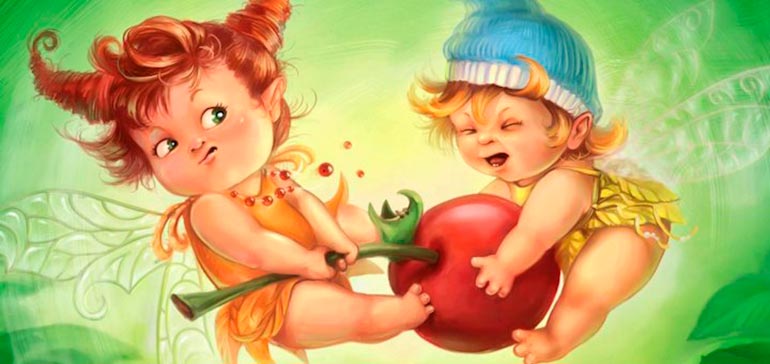

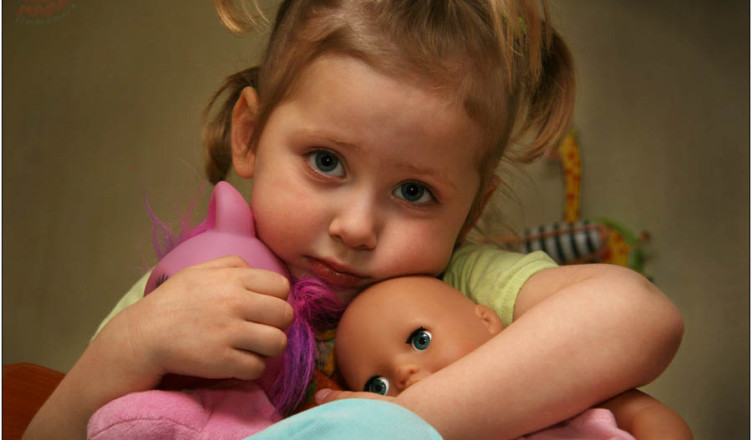
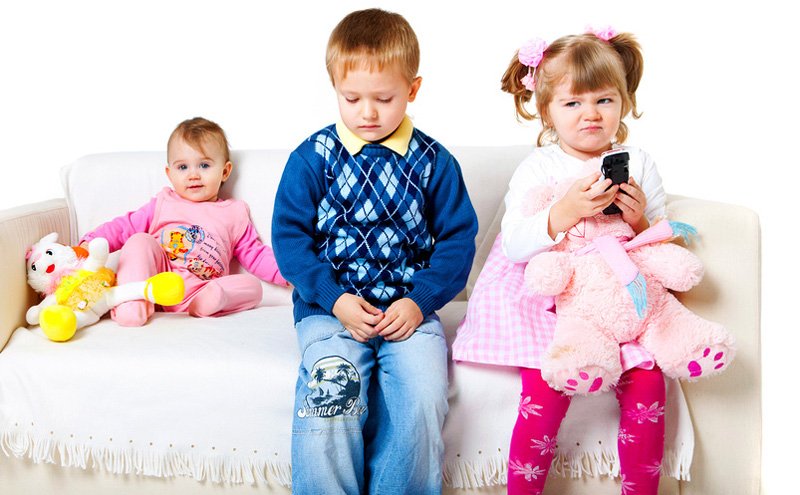
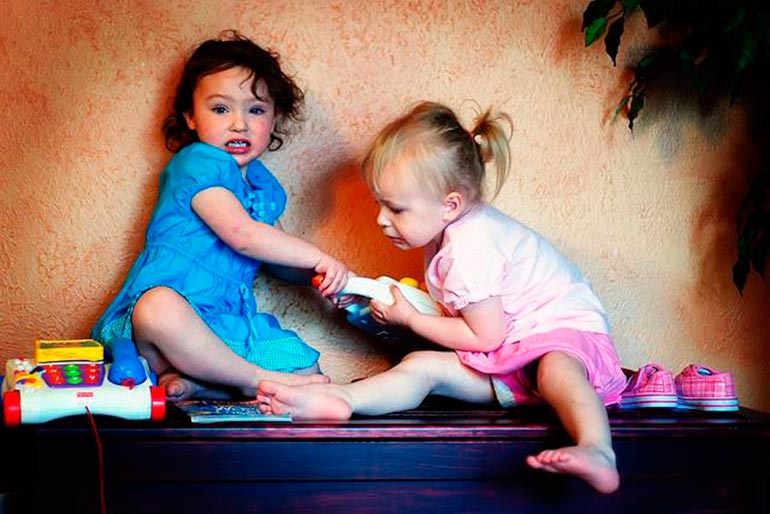
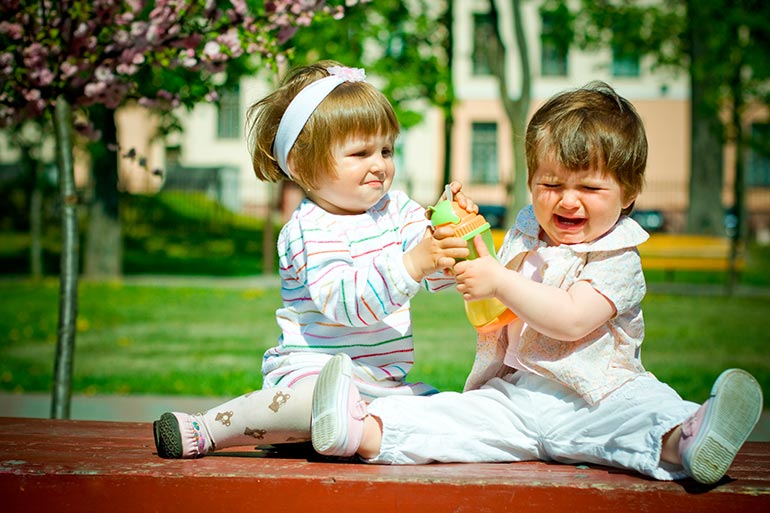








My daughter is only one and a half years old, she loves to grab my mobile phone, view photos there or crawl into some applications, and then she doesn’t want to give back only with a fight, it's just interesting for the child. It seems to me that it is important to explain to the child that things are not the main thing, but it is much better to spend time with the child in nature, to pay attention to him, then there will be no problems with greed.
My child under two years old was also very greedy, talked to him, explained. But after a very short time, calmly plays on the street, shares with all his toys. Probably everyone goes through this, you need to wait a bit when the baby grows up and begins to understand everything.
I read the article and immediately remembered a case from life. My son and I went for a walk and he took with him a tumbler toy he liked very much in the form of a lynx. At the playground, children vied with him for a toy. Naturally, he did not want to give the tumbler back. Then I said that the kids only want to hold her and look at a beautiful toy. I remember the situation was resolved calmly. And at home I tried to explain that if he doesn’t want to show some toy, then it’s better to leave it at home. In my opinion, the lesson was not in vain then, my son is already a graduate student and enjoys authority among friends.
My son recently turned 5 years old, his name is Vadim. In the kindergarten, he formed his own circle of friends, where they willingly exchange their toys, sometimes even several at once. But there were times when I took Vadim from the kindergarten, he said that some did not give play with their toys. And I always give him advice - sooner or later you will have a toy cooler than the one from whom you saw it. The main thing is to reassure the child and set up in a positive way, because in life everything can be obtained and bought. And over time, the child understands and becomes loyal.